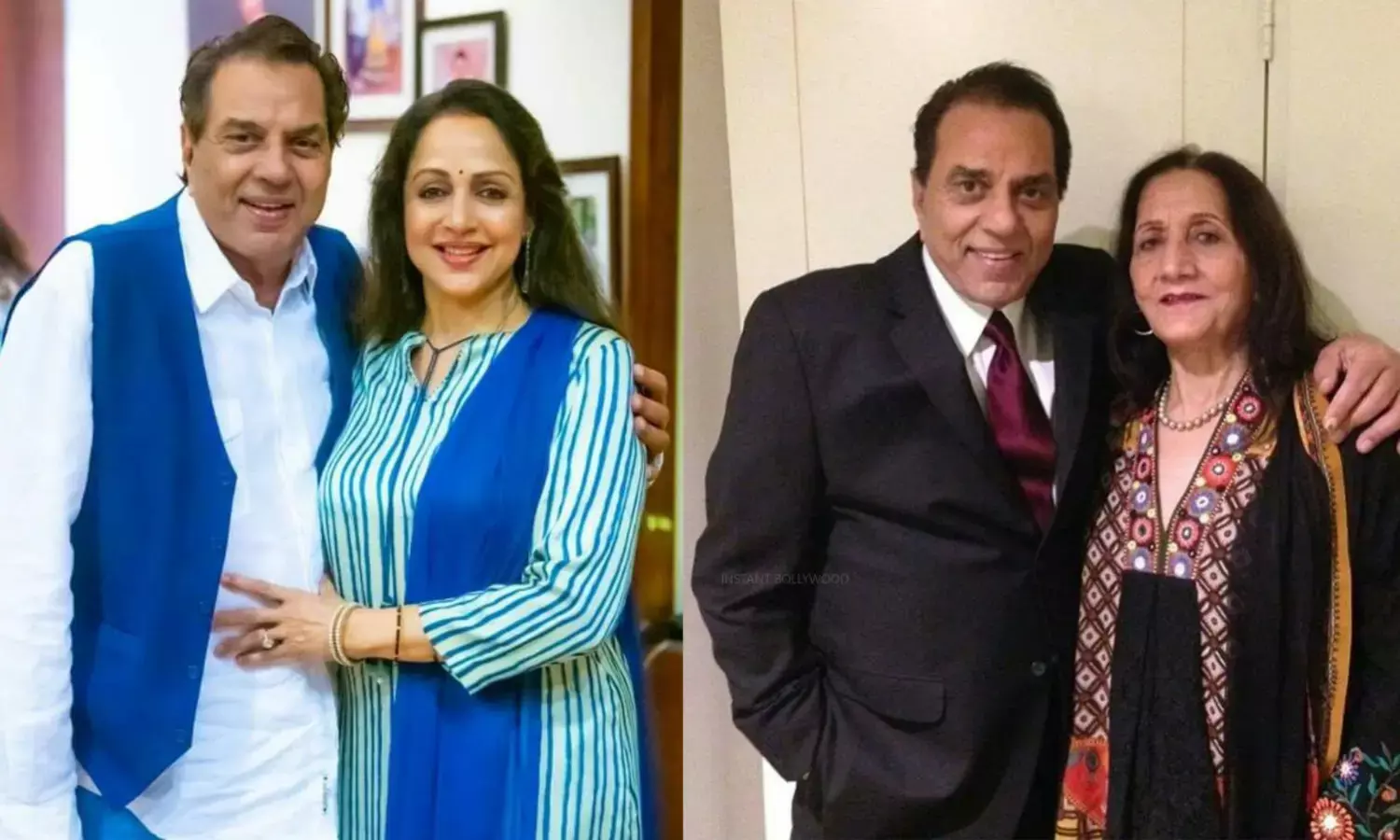Dharmendra Between Two Worlds — A Love Story the World Judged, And The Wife Who Never Let Go

Dharam Singh Deol — the man the world lovingly calls Dharmendra — has been admired for decades as Bollywood’s original “He-Man”. With memorable performances in Phool Aur Paththar, Mera Gaon Mera Desh, Sholay, and many more, he climbed remarkable heights in Indian cinema. But while his on-screen life dazzled viewers, his personal life has always sparked curiosity, admiration, and controversy in equal measure.
The First Chapter: A Young Marriage Rooted in Tradition
Long before superstardom knocked at his door, Dharmendra was a 19-year-old from Punjab stepping into an arranged marriage. In 1954, he tied the knot with Prakash Kaur, a simple and deeply grounded woman. Together, they built a family welcoming four children — Sunny Deol, Bobby Deol, Vijeta, and Ajeeta.
As Dharmendra’s career soared, Prakash remained away from the public eye, nurturing her children and holding the household together. She watched the rise of a superstar, but she also witnessed the arrival of another chapter that would alter their lives forever.
When Love Struck Again — And Shook the Nation
While being married to Prakash, Dharmendra met and fell deeply in love with Hema Malini. The chemistry between the two superstars was impossible to ignore — both on and off screen. Yet, there was one reality that Dharmendra struggled with: he could not imagine abandoning his first wife and family.
In 1980, in an effort to keep both his commitments intact, Dharmendra converted to Islam and married Hema Malini. With her, he later welcomed daughters Esha Deol and Ahana Deol.
While the country debated ethics, morality, and loyalty, the person who was expected to break down — remained silent.
Prakash Kaur: A Wife Who Loved Without Public Drama
For years after Dharmendra’s second marriage, Prakash Kaur never uttered a word to the media. She bore the criticism, the sympathy, and the gossip with grace. Finally, in 1981, she gave her first interview — one that revealed the depth of her love rather than the bitterness the world expected.
Her words were honest, vulnerable, and unforgettable. She described Dharmendra as:
“the first love and the last man of my life.”
She spoke of hurt, but not hatred. Pain, but not revenge. For her, the father of her children was still a man she trusted — someone she believed would always show up if she ever needed him.
Standing Up for the Man Everyone Criticised
The world called Dharmendra names — womaniser, disloyal, selfish. But Prakash refused to let those labels define him. In the same interview, she questioned the hypocrisy within the entertainment industry, where infidelity was widespread yet only her husband was put on trial by public opinion.
Even more surprising was her comparison with Hema Malini. With striking honesty she admitted that it was natural for a man to fall for someone as beautiful and graceful as Hema. She empathised with the actress too — understanding the pain of being branded “the other woman”.
It takes a rare heart to acknowledge another woman’s beauty and dignity in a situation of shared pain.
Not a Wife Who Lost — But a Woman Who Chose Peace
According to Prakash, she never felt insecure, because Dharmendra never abandoned his duties. He remained a loving father and a responsible partner. No matter how glamorous his second marriage looked to the outside world, he returned home every day — and for Prakash, that held more value than public validation.
71 Years Later — Still His Strength
Time creates distance in most relationships, but in theirs it created resilience. Even after more than seven decades of marriage, Prakash Kaur has never shown hostility toward Dharmendra. She loved him deeply, accepted him wholeheartedly, and chose dignity over noise.
In an era where love is often weighed against ego, her story reminds the world of a forgotten kind of devotion — one that survives judgment, fame, heartbreak, and time.
A Story With No Villains — Only Human Hearts
Dharmendra, Prakash Kaur, and Hema Malini’s story can be seen from many lenses — romance, sacrifice, controversy, or destiny. But perhaps the most honest view is this:
Three lives intertwined in a way none of them planned.
Two women loved the same man.
And one man loved both — imperfectly, but truthfully.
In the end, there are no winners or losers — only people who navigated love the way life presented it.


